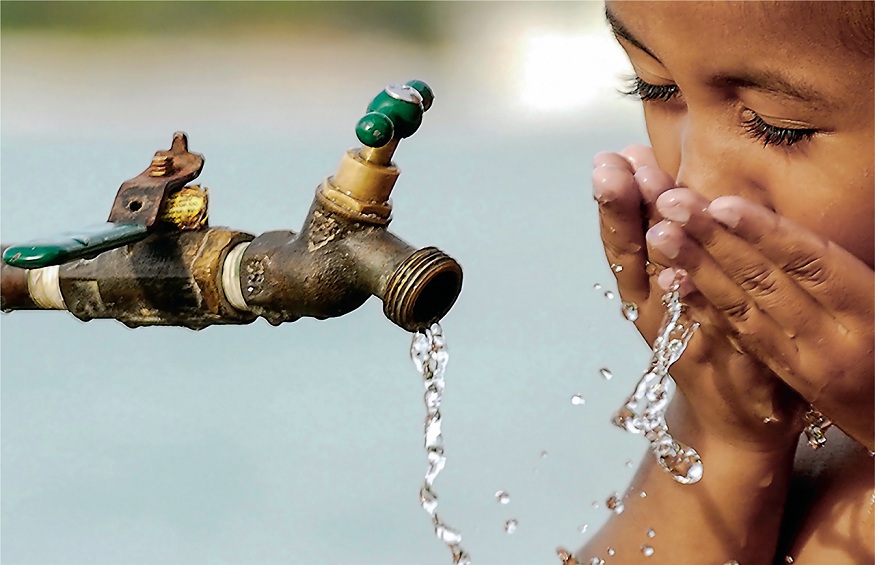If you’ve been noticing a rusty taste or colour in your water, don’t panic just yet. It could be caused by a number of different things, but before you start any major project, it’s best to try some simple fixes first. In this article, we’ll outline some of the most common causes of rusty water and give you some tips on how to fix them. So read on and find out how to get your water back to its former glory!
What Causes Rusty Water?
There are a few reasons why water might turn red, yellow or brown. If you happen to live in an older home, there’s a good chance that the pipes in your home are made out of galvanized steel. These kinds of pipes might become rusted if they aren’t properly maintained. Too much rust can lead to water flowing in all directions as opposed to only where it’s supposed to flow and this can be detrimental to the health of you and your family.
It could be the case of an old tap. Finding that there is rusty water coming through a tap in your house isn’t something you ever want to come up against. Because of the sediments and corrosion, however, you’ll need to intervene soon. If you have time and resources, replace the problem fixture with a new one; otherwise, consider investing in a home water softener or an under-sink filtration system for optimal results!
It’s not always about what’s going on in our homes – sometimes important changes need to be made at the public service department. When an issue arises with your water source, don’t freak out! Call your local public works or water department and check if there is a water main break, or some sort of malfunction that is impacting everyone in your area rather than just you.
Why You Should be Concerned About Rusty Water
Rusty water can be a sign of a bigger problem, so you should be concerned if you’re experiencing it. Rusty water can be caused by a number of things, including corrosion, rusting pipes, or even a faulty water heater.
If the rusty water coming from your taps has yet to be fixed, it’s important to take preventative measures in order to ensure that you’re stopping this problem from getting worse. Left untreated, contaminated drinking water can cause severe damage and complications to your plumbing system as well as spreads bacteria throughout your entire home.
If you’re not sure what’s causing your rusty water, contact a professional drainage company in London, or wherever it is you live, for help.
Signs of Pipe Rust
Rusty pipes are a nightmare for any homeowner. Before the tell-tale orange stains spread across your floor, and you start experiencing pipe-leaks, it can be easy to notice early signs of rust developing in your pipes. If you see pipe rust anywhere, it’s vital to call your plumber as soon as possible. Wherever you find orange stains, you’re going to find rust. This can be a sign of a bigger problem down the road. You may not need to repair pipe rust immediately, but it’s best to take preventative measures as soon as possible.
Another way is odour. Perhaps the water issuing from your tap gives off an unpleasant odour and flavour. This is yet another sign that your pipes have developed corrosion as a result of using harsh chemicals to clean them.
If your sinks, toilet or shower pipes don’t smell or look funny, then they may not be rusted and corroding. However, if you’re noticing frequent clogs in the drainage system, then it could be a sign that your pipes are starting to accumulate sediment. This causes water pressure to fluctuate within the pipe, resulting in poor water flow during use and reduced water pressure throughout the entire house.
Simple Fixes for a Quick and Easy Solution
If you’re experiencing rusty water, don’t wait-try these simple fixes first and then investigate the source of the problem. So read on for some simple solutions to a common plumbing dilemma!
- Clean out your tap aerators. Tap aerators can become clogged with rust and other debris, which can cause your water to become rusty. To clean them out, remove the aerator from your taps and scrub it with a brush.
- Install an anti-rust water treatment system. If your water is especially prone to rusting, you may want to consider installing an anti-rust water treatment system. This will help to prevent rust from forming in your pipes and will keep your water tasting clean and clear.
- Check your water heater. A faulty water heater can be a common cause of rusty water. If you think that your water heater might be the difficulty, have a professional take a look at it and see if it needs to be repaired or replaced.
- Check nearby pipes. If your water heater is working properly, the source of the rusty water might be a pipe that’s located near your home. Rust can easily spread from one pipe to another, so it’s important to check all the pipes in your home for any signs of rusting.
- Check for contact with metal underground. If you have any metal underground near your home, it could be causing your rusty water. Contact with metal can create a chemical reaction that causes rust to form in your pipes. So if you’re experiencing rusty water, take a look around your property and see if there’s any metal that could be causing the issue
If you’ve tried all of these fixes and your water is still rusty, it’s time to investigate the source of the problem. Contact a professional plumber to help you find and fix the source of your rusty water.
Did this help?
Plumbing pipes can start to show signs of rust which may indicate that the water supply in a building is being affected. It’s important to have a working knowledge of plumbing, as pipes are always breaking down or leaking. If left unattended, tiny leaks can soon become major wrecks.

